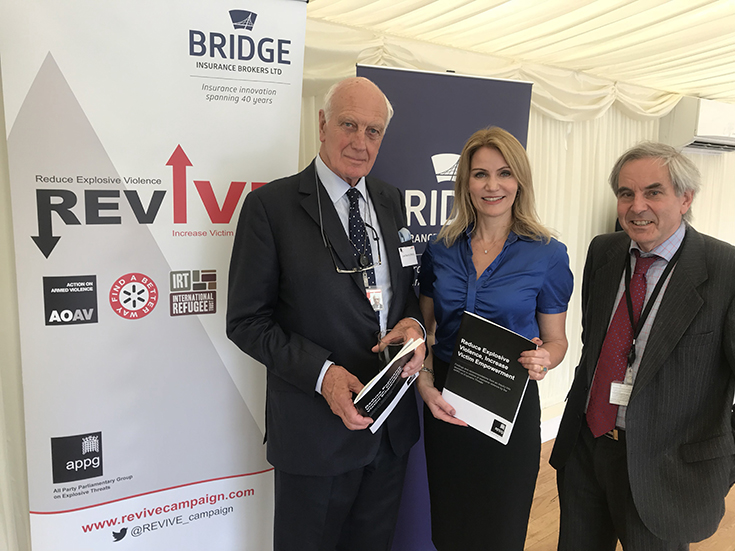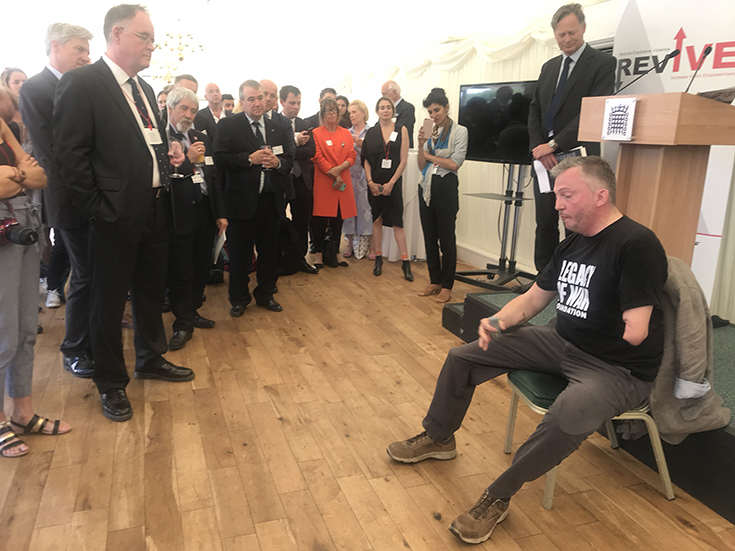UK politicians and charities call for Government to implement effective strategies to help victims of explosive violence
In the light of a two-fold increase in extremely violent conflict in the last decade and with around 40,000 civilians killed or injured by explosive weapons in 2017 alone, UK politicians and charities are calling on UK Secretary of State for International Development Penny Mordaunt, to address issues surrounding effective strategies for victims' assistance.

Head of Secretariat of the APPG on Explosive Threats, Nigel Ellway, with Lord Geoff Dear and Former Danish PM Helle Thorning-Schmidt
The Revive campaign– Reduce Explosive Violence Increase Victim Awareness –presented shocking findings at a meeting in the House of Commons, part of a four-month inquiry by the All Party Parliamentary Group (APPG) on Explosive Threats.
The figures show that:
-
2017 saw the highest number of civilian deaths seen in the seven years since records began. Most casualties of explosive weapon use were civilians, accounting for almost 75 per cent of all recorded deaths and injuries.
-
80 per cent of those killed by Improvised Explosive Devises (IEDs) were civilians. Although suicide bombings represent 23 per cent of all IED incidents recorded, they account for 62 per cent of all deaths and injuries from IED attacks.
-
68 per cent of incidents using air-launched weaponry were recorded in populated areas, demonstrating a marked shift from previous years. In 2016 the percentage was 46 and 43 in 2015 and 47 in 2013.
-
In 2017 there were 31,904 civilian deaths and injuries from explosive weapons reported around the world. In total, 24,848 people were killed (of which 16,289 were civilians) and 18,124 were injured (of which 15,615 were civilians) by explosive weapons.
Revive aims to shed some light on the alarming rise of the use of explosive weapons on civilians and raise awareness of the individuals and organisations which provide help and support to victims of explosive violence in partnership with Sir Bobby Charlton’s charity Find a Better Way, Emergency UK, Action on Armed Violence, Legacy of War and International Refugee Trust.
Matthew Offord MP, Chairman of the APPG on Explosive Threats, said: “We know that particularly for children, injuries from explosive weapons can be devastating and life changing. Support for these people is not just a one off – it is long term.
“Prevention, as they say, is the best cure – but as the casualty figures for 2017 show, and despite all our best preventative efforts, victim numbers continue to rise. We in governments around the world need to provide the means to support those victims, as well as the victim assistance organisations, who themselves are often working under threat of explosive violence.”

Giles Duley gave a powerful and emotive talk about the effects of explosive violence
The inquiry also included recommendations for the Department for International Development (DfID) to:
Create a separate long-term funding stream for victim support. The UK government, through DfID, has recently increased the funding going to mine-action. Victim assistance is a major pillar of mine-action, but in the evidence, it is clear that the majority of the funding goes towards much needed clearance and mine risk education.
Set a universal standardization of terminology and data recording. Collecting data remains one of the biggest challenges in war and emergencies. Counting the number of injured or dead is crucial, but there is little standardisation of terminology and methodology. A database of victims by demographic with type and severity of injury would facilitate early response and treatment.
Improve training and capacity building. Blast inflicts a particular set of injuries – physical and psychological – that require specialist treatment and care. The report calls for investment in training and capacity building in communities impacted by explosive violence.
Roger Potts, Chairman of Bridge Insurance Brokers, the main sponsor of the REVIVE campaign, noted: “Bridge are extremely proud to be Patrons of Revive. Supporting and enabling clearance fieldwork and its humanitarian benefits around the world, forms an important part of our business. I look forward to working with my team to be positive contributors to the Revive awareness programme.”